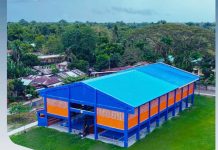TACLOBAN CITY – Dioni Manatbanat, a Mamanwa tribe leader, only finished first grade in elementary and he does not even remember to read and write, a plight that he won’t allow his young ethnic group members to experience. Manatbanat, who hails from the remote village of Kagbana, attended the launching of the government’s Indigenous People (IP) Education last September 25 at the regional office of the Department of Education (DepEd) in Palo, Leyte. “Life is hard for someone like me who doesn’t even know how to read and write. We really need help from the government because many of our tribe members have no money to send their children to school,” said the 40-year old tribe leader, the most respected males in their community of 50 members. Unlike him, Manatbanat’s five children made it to school. His eldest child finished secondary, the highest educational level attained by a Mamanwa member in Kagbana village, 40 kilometers away from the town center of Burauen, Leyte.
“For many decades, obtaining education was not part of our life. What was important to us is that we’re able to eat,” he recalled. The ethnic leader’s family migrated from Mindanao to Leyte in 1981. Providing education to the indigenous group has been implemented since 2011 after the issuance of DepEd Order No. 62 or the National Indigenous Peoples Education Policy Framework. However, it is only this year that the DepEd launched a regional convergence of IPED (indigenous people education) involving local government units, educators, national government agencies, and non-government organizations.
IPED employs mother tongue-based multilingual education, which starts from where the learners are and from what they already knew. The system is flexible as it allows schools to localize, indigenize and enhance the same based on their respective educational and social contexts. “It’s not about schooling, but it is also about respecting culture. IPED enable communities to ultimately determine the relevance and responsiveness of education,” said Rozanno Rufino, DepEd advisor to Secretary Armin Luistro on IP concerns.
The community where the Mamanwa resides only hosts an elementary school, said Manatbanat. The nearest high school campus is 40 kilometers away which can be reached through a two hour single motorcycle ride traversing bumpy roads and three hours hike crossing four mountains and three rivers. Each of the 10 families in the tribe earns an average of P1,500 monthly from gathering wildly grown rattan, a raw material for baskets and furniture which they sold through a five-hour hike to highway in Baybay City.
The Mamanwa group is one of the estimated 1,000 potential learners from the ethnic group in the provinces of Leyte, Samar and Eastern Samar. Rosemarie Guino, regional IPED focal person, said that there are three known indigenous groups in the region – Badjao, Manobo and Mamanwa. Badjao has established settlements in Bato and Isabel, Leyte; Mamanwa dwells in Burauen, Leyte; San Jose de Buan, Basey, Marabut, all in Samar; San Roque and Las Navas in Northern Samar. “Under IPED, they will be taught with the basic literacy through the alternative learning system. Teaching is designed in such a way that they will preserve their culture,” Guino said. (SARWELL Q.MENIANO)



